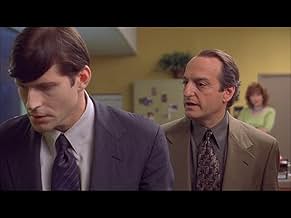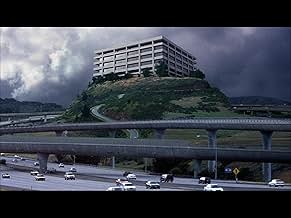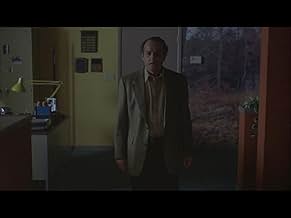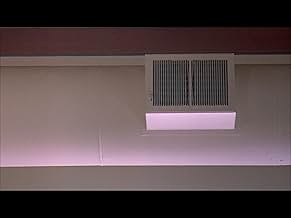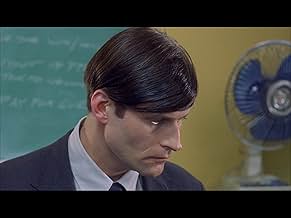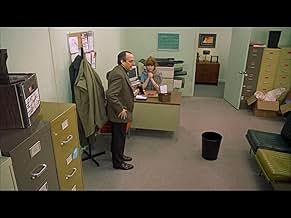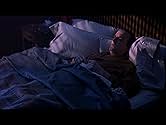AVALIAÇÃO DA IMDb
6,4/10
2,3 mil
SUA AVALIAÇÃO
Adicionar um enredo no seu idiomaA clueless boss has no idea what to do with his mundane office worker whose refusal of duties only gets worse each passing minute.A clueless boss has no idea what to do with his mundane office worker whose refusal of duties only gets worse each passing minute.A clueless boss has no idea what to do with his mundane office worker whose refusal of duties only gets worse each passing minute.
- Direção
- Roteiristas
- Artistas
- Prêmios
- 1 indicação no total
Stu Klitsner
- Professor Bum
- (as Stuart Klitsner)
Catherine DiNapoli
- Rocky's Girlfriend
- (as Catherine di Napoli)
- Direção
- Roteiristas
- Elenco e equipe completos
- Produção, bilheteria e muito mais no IMDbPro
Avaliações em destaque
I never heard of this movie until couple of weeks ago when I saw it on TV. This brings my question - where do all the good, "small", independent movies go after they've been created and screened on the Sundance Film Festival? How do we learn about their existence? Where do we read about them? And most importantly, where can we see them?
Bartleby, the first film directed and written by Jonathan Parker is a real gem - modern version of the Melville's short story "Bartleby the Scrivener" with absolutely amazing cast.
Crispin Glover plays Bartleby, the man who was hired, but preferred not to work and who was fired, but preferred not to leave. David Paymer is his clueless boss who tries to understand what he is dealing with. Glenne Headly is Vivian, an office secretary, the woman of many adorable talents; Maury Chaykin, and Joe Piscopo are his coworkers in the one of the most boring office ever existed. The office is located in the building that sits on the top of the hill and comes directly from the El Greco's painting "View of Toledo" with its atmosphere of mystery, danger, and loneliness: Would you like to work in the building like that? I'd prefer not to...
I believe Parker made a very impressive debut - the film is creatively shot, the use of music is amazing - Beethoven's sonata turns into a creepy, quirky and moody Bartleby's theme for which Parker used theremin - very interesting and unique musical instrument. Parker and his co -writer transported 'Bartleby the Scrivener' into a surreal and absurd black comedy - satire on bureaucracy and alienation in the insane and cruel modern world.
Franz Kafka's name came to my mind more than once while watching the film - he would've loved that absurd, funny but dark and sad story. Also, if ever a good movie is made about one of the greatest and tragic writers of 20th Century, Crispin Glover should play him. Just compare their pictures...
Bartleby, the first film directed and written by Jonathan Parker is a real gem - modern version of the Melville's short story "Bartleby the Scrivener" with absolutely amazing cast.
Crispin Glover plays Bartleby, the man who was hired, but preferred not to work and who was fired, but preferred not to leave. David Paymer is his clueless boss who tries to understand what he is dealing with. Glenne Headly is Vivian, an office secretary, the woman of many adorable talents; Maury Chaykin, and Joe Piscopo are his coworkers in the one of the most boring office ever existed. The office is located in the building that sits on the top of the hill and comes directly from the El Greco's painting "View of Toledo" with its atmosphere of mystery, danger, and loneliness: Would you like to work in the building like that? I'd prefer not to...
I believe Parker made a very impressive debut - the film is creatively shot, the use of music is amazing - Beethoven's sonata turns into a creepy, quirky and moody Bartleby's theme for which Parker used theremin - very interesting and unique musical instrument. Parker and his co -writer transported 'Bartleby the Scrivener' into a surreal and absurd black comedy - satire on bureaucracy and alienation in the insane and cruel modern world.
Franz Kafka's name came to my mind more than once while watching the film - he would've loved that absurd, funny but dark and sad story. Also, if ever a good movie is made about one of the greatest and tragic writers of 20th Century, Crispin Glover should play him. Just compare their pictures...
My first reaction to "Bartleby" is that this movie is much like a previous Crispin Glover effort, "Rubin and Ed" about a strange, directionless man with little background, who plods his way through life carelessly. Some of the awkward moments and surreal dialogue and movements within Bartleby seem to be forced, trying to hard, to capture a campy feel. The film doesn't quite reach a campy status though because of this. Although Glover captures his quirky behavior perfectly, from staring at the air vent for hours, to endlessly saying "I prefer not to.." to every work request, and the dynamics of the working relationship with his boss are interesting at times. Joe Piscopo and Maury Chaykin have some strange roles as co-workers who are up to no good... how these guys stay employed are a mystery.
Bartleby has two major problems. One is, it just gets boring. A good slow movie can do and say a lot, but Bartleby just seems to be obsessed more with how weird it can be, how far it can push the surrealism of its cast and the corporate buildings on the hills. Another thing is, why does Bartleby's boss take such an interest in him? What is the motivation? Perhaps this is best explained in Herman Melville's book, from which this movie is based. For a Crispin Glover fan, this is even barely worth watching.
Bartleby has two major problems. One is, it just gets boring. A good slow movie can do and say a lot, but Bartleby just seems to be obsessed more with how weird it can be, how far it can push the surrealism of its cast and the corporate buildings on the hills. Another thing is, why does Bartleby's boss take such an interest in him? What is the motivation? Perhaps this is best explained in Herman Melville's book, from which this movie is based. For a Crispin Glover fan, this is even barely worth watching.
The head of a public records office advertises for a new employee. Only one person responds--Bartleby, a former postal worker who at first files like a demon then lapses into apathy. Bartleby stands all day looking at an air vent in the ceiling, responding to every request from his boss and coworkers with, "I would prefer not to." Eventually the boss retaliates with passive-aggressive acts aimed at getting rid of the man. Till the very end, however, Bartleby remains an enigma, a human cipher who refuses to give up his secrets.
Hardly an engaging story premise? That's what I thought when I trudged through Herman Melville's mid-nineteenth century story "Bartleby the Scrivener" in college lit class. Sure, the story has an important theme and some interesting symbolism, but it's also dull, dull, dull. However, director Jonathan Parker has taken the best sort of revenge on this canonical work of American literature; he's turned it into a zany, low-budget, laugh fest--getting across many of the essential ideas while also entertaining his audience. Parker has approached the sort of exaggerated, stale, depressing office atmosphere seen at the beginning of "Joe Versus the Volcano" and turned it inside out, covering it with a colorful, kitschy facade to inflate the absurdity of modern information mills.
Essential to the success of the film is the fine ensemble cast. Crispin Glover deserves more lead roles, and though with Bartleby he does spend most of his time immobile and silent, perhaps no other actor can accomplish more with simple posture, well-manipulated expressions, and quirky movement. Glenne Headly is a scream in her exaggerated seduction attempts aimed at Seymour Cassel. Joe Piscopo is also in fine form as the office macho man, though he has aged dramatically since we saw him last in, what--"Wise Guys"? Maury Chaykin gives the overweight and nerve-racked Ernie a comic flair, playing with his desktop windup toys only to flinch every time they jump, and pulling off an impressive physical comedy scene involving a sandwich, a photocopier, and a watercooler. Finally, David Paymer as "The Boss" provides a solid focus for the film with his adaptive performance of a complex character.
Hardly an engaging story premise? That's what I thought when I trudged through Herman Melville's mid-nineteenth century story "Bartleby the Scrivener" in college lit class. Sure, the story has an important theme and some interesting symbolism, but it's also dull, dull, dull. However, director Jonathan Parker has taken the best sort of revenge on this canonical work of American literature; he's turned it into a zany, low-budget, laugh fest--getting across many of the essential ideas while also entertaining his audience. Parker has approached the sort of exaggerated, stale, depressing office atmosphere seen at the beginning of "Joe Versus the Volcano" and turned it inside out, covering it with a colorful, kitschy facade to inflate the absurdity of modern information mills.
Essential to the success of the film is the fine ensemble cast. Crispin Glover deserves more lead roles, and though with Bartleby he does spend most of his time immobile and silent, perhaps no other actor can accomplish more with simple posture, well-manipulated expressions, and quirky movement. Glenne Headly is a scream in her exaggerated seduction attempts aimed at Seymour Cassel. Joe Piscopo is also in fine form as the office macho man, though he has aged dramatically since we saw him last in, what--"Wise Guys"? Maury Chaykin gives the overweight and nerve-racked Ernie a comic flair, playing with his desktop windup toys only to flinch every time they jump, and pulling off an impressive physical comedy scene involving a sandwich, a photocopier, and a watercooler. Finally, David Paymer as "The Boss" provides a solid focus for the film with his adaptive performance of a complex character.
I loved this film and I cannot believe how so few critics liked it. What were they thinking? Apparently one critic thought since it was based on a short story that the film should be shorter. Of course, once one critic says its too long, every other critic has to agree. I guess David Mamet is an exception to the rule. Bartleby is not too long. It deserves it's running time so that we can absorb the story more closely. When we hear Bartleby repeat the same words: "I'd prefer not to" we are not given any explanation for the comment but yet it becomes extremely poignant. Eventually everyone in the office begins to use the word "prefer" and we see how Bartleby has affected the workplace like a disease. The film is very bizarre particularly because of the way the boss reacts to Bartleby. Instead of just firing the guy for not doing his job, he tries to reason with him. Eventually Barlteby gets in an even more bizarre predicament that has even more to do with just "prefering not to" work. The boss is obsessed with Bartleby and the film turns very Kafkaesque. We see a capitalist scenario where people topple on another for greed, power and respect. The film is based on the short story "Bartleby the Scrivener" by Herman Melville. It was appropriate to mention the source because the story seems very relevant not only to our modern culture but also to what Melville went after writing Moby Dick. The film also has a wonderful score with a Theramin instrument and a brilliant cinematography.
Herman Melville's `Bartleby the Scrivener' has always been one of my all-time favorite short stories, a masterpiece of tone that features one of the most enigmatic characters in literary history. With devastating wit and understated irony along with a keen appreciation for the absurdist and the surreal - Melville tells the tale of a well meaning though banally efficient pragmatist who is forced to reconsider his values when he runs up against a certified (and perhaps certifiably insane) nonconformist. After he hires Bartleby to be a clerk in his office, the (unnamed) employer quickly discovers that the taciturn, quirky young man has no intention of doing any work - and, even more strangely, that he feels no compulsion to explain his state of self-imposed inertia. What makes Bartleby fascinating is that he is a nonconformist simply by nature and not because he has any real bone to pick with society or the people around him. This lack of explanation frustrates the boss, of course, and some readers as well. But it is Bartleby's defining phrase, `I would prefer not to' - delivered like a refrain throughout the course of the story - that speaks for those in society who question the value and purpose of the myriad irrelevant tasks we are compelled to perform as we make our way through life.
Melville conceived his story as a stinging indictment aimed against the dehumanizing effect of the business world's bureaucratic structure. How appropriate, then, that the makers of this current film version (now called simply `Bartleby') have chosen to set the tale in the present day, when that guiding philosophy has become, if anything, even more pronounced. David Paymer is splendid as the public records office manager who finds himself embroiled in an epic battle of wills against a force he cannot understand yet, in some bizarre fashion, can also not help identifying with and admiring. Crispin Glover is the pasty-faced Bartleby who seems to slip further and further into a state of catatonic madness as the story progresses. In their screenplay, Jonathan Parker (who also directed the film) and Catherine Di Napoli have retained the flavor of the original, combining hilarious and poignant moments in roughly equal measure. For even while we are laughing at the absurdity of both Bartleby and the other eccentric staff members in the office, we are also being made aware as the boss is of just how unique and admirable a creature Bartleby truly is.
With its deliberate pacing, its starkly antiseptic, parti-colored sets and its eerily moody musical score (some of it reminiscent of Bernard Herrmann's work for `The Day the Earth Stood Still'), the film takes us to a highly stylized world where the events we see depicted come to make total sense. Only the most blatant realist will be inspired to question the wisdom of the main character's actions concerning Bartleby. All the rest of us will see the boss for the open-minded humanitarian Melville intended him to be.
Parker has pulled together an interestingly offbeat group of actors to serve as his supporting cast, including Dick Martin, Joe Piscopo and Carrie Snodgrass. Glenne Headly is particularly wonderful as a flirtatious office worker who spends most of her time making suggestive comments, gestures and even foodstuffs to lure men her way.
It's the extraordinarily controlled and brilliantly delivered deadpan humor that makes `Bartleby' an adaptation worthy of its source. This movie proves that Melville's nonpareil creation will forever be a timeless tale.
Melville conceived his story as a stinging indictment aimed against the dehumanizing effect of the business world's bureaucratic structure. How appropriate, then, that the makers of this current film version (now called simply `Bartleby') have chosen to set the tale in the present day, when that guiding philosophy has become, if anything, even more pronounced. David Paymer is splendid as the public records office manager who finds himself embroiled in an epic battle of wills against a force he cannot understand yet, in some bizarre fashion, can also not help identifying with and admiring. Crispin Glover is the pasty-faced Bartleby who seems to slip further and further into a state of catatonic madness as the story progresses. In their screenplay, Jonathan Parker (who also directed the film) and Catherine Di Napoli have retained the flavor of the original, combining hilarious and poignant moments in roughly equal measure. For even while we are laughing at the absurdity of both Bartleby and the other eccentric staff members in the office, we are also being made aware as the boss is of just how unique and admirable a creature Bartleby truly is.
With its deliberate pacing, its starkly antiseptic, parti-colored sets and its eerily moody musical score (some of it reminiscent of Bernard Herrmann's work for `The Day the Earth Stood Still'), the film takes us to a highly stylized world where the events we see depicted come to make total sense. Only the most blatant realist will be inspired to question the wisdom of the main character's actions concerning Bartleby. All the rest of us will see the boss for the open-minded humanitarian Melville intended him to be.
Parker has pulled together an interestingly offbeat group of actors to serve as his supporting cast, including Dick Martin, Joe Piscopo and Carrie Snodgrass. Glenne Headly is particularly wonderful as a flirtatious office worker who spends most of her time making suggestive comments, gestures and even foodstuffs to lure men her way.
It's the extraordinarily controlled and brilliantly delivered deadpan humor that makes `Bartleby' an adaptation worthy of its source. This movie proves that Melville's nonpareil creation will forever be a timeless tale.
Você sabia?
- CuriosidadesDick Martin's final acting performance.
- Erros de gravaçãoWhen "The Boss" goes to check out a new place for their office, he settles on a place with no electrical outlets on 3 of the walls. (The 4th wall is not shown) There's a Xerox and every desk has a computer. This arrangement would be completely unacceptable for any office manager.
- Cenas durante ou pós-créditosBefore the opening credits begin, viewers are given a portrait and short biography of Herman Melville, upon whose story the film is loosely based.
- ConexõesReferenced in Stargate: Atlantis: The Lost Boys (2005)
- Trilhas sonorasPhantasie #3 In D Minor
Written by Wolfgang Amadeus Mozart (as Mozart)
Background music on piano by Nancy Spottiswoode
Principais escolhas
Faça login para avaliar e ver a lista de recomendações personalizadas
- How long is Bartleby?Fornecido pela Alexa
Detalhes
- Data de lançamento
- País de origem
- Central de atendimento oficial
- Idioma
- Também conhecido como
- Bartleby at the Office
- Locações de filme
- Empresa de produção
- Consulte mais créditos da empresa na IMDbPro
Bilheteria
- Faturamento bruto nos EUA e Canadá
- US$ 148.479
- Fim de semana de estreia nos EUA e Canadá
- US$ 14.599
- 27 de mai. de 2002
- Faturamento bruto mundial
- US$ 148.479
Contribua para esta página
Sugerir uma alteração ou adicionar conteúdo ausente


